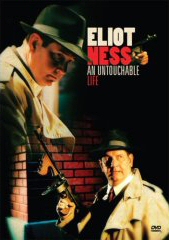
A noirish jazzy score plays over the opening credits, as a camera moves in slowly on a stage in a theatre. The stage has been set to provide a mock-up of Eliot Ness' office.
As the credits end, a caption appears on screen: "May 16, 1957". We are now in the kitchen of the Ness household. The telephone is ringing.
Eliot Ness (Michael Cornelison, SUPERSTITION) enters the room and answers the call, accepting a long-distance call from publisher Oscar. We only hear Ness' side of the conversation, but it becomes apparent he has just finished reading a transcript of a book based on his exploits entitled "The Untouchables".
Ness confirms that he is largely satisfied with the book, but has one gripe: his story has been "jazzed up" to make him into something special. He protests that he did not single-handedly bring notorious gangster Al Capone to justice - it was a team effort. Oscar reminds Ness that he has already cashed his cheque for the book, and the call ends amicably.
Ness makes for the kitchen table and helps himself to a glass of whiskey. It's at this points that he looks into the camera and address the viewer. He tells us he was never opposed to booze and always thought that prohibition was a stupid law. He's just a normal man who was doing his job, in other words.
From hereon in, Ness is engaged directly with the viewer, as he moves from kitchen to back alley, to various old haunts and even his old office while recounting his story in his own words.
He tells us about his childhood helping his baker father, and how he loved reading Sherlock Holmes books. He takes us fondly through his memories of his first love, and how he agonised about whether to follow his mother's wishes for him and go to college, or find a job straight after finishing school.
All of which is very well in helping to establish the very ordinary nature of this near-mythical figure. And it's once his backstory has allowed us into Ness' very human side, that he starts his detailed account of the most interesting chapter in his life: the Capone years.
Ness' commentary gives us great insight into his first landing a job with the FBI, to how he and his team built up evidence against Capone (including stuff that strongly suggested Capone had ordered the murders of some 300 rival mobsters) but were never able to use it against him.
Naming names, being scene and time specific, and even making accusations (such as the hitman who was hired by Capone to kill Ness), this fictional Ness offers an incredibly comprehensive account of his life as the man permanently two steps behind Public Enemy Number One.
It's a startlingly well-written history lesson, courtesy of author and director Max Allan Collins (he was behind the graphic novel that became the Tom Hanks film ROAD TO PERDITION). It would go down well in schools I'd imagine, particularly in America.
As a film, it's a little less successful. Cornelison can't be faulted, his performance is superb - literally carrying the film by himself. The writing is of course great, and between that and Cornelison's strong persona, they're what keep NESS interesting. However, there are factors working against them - Collins' direction is largely flat and lacking imagination, while the jazz score that plays incessantly under Cornelison's monologue is grinding after a while. And 105 minutes is about 20 minutes too long. Ambitious and admirable to stretch to such a length, yes, but the end result is a little tiresome.
Although it must be said that, come the end when the camera pulls back to reveal Cornelison performing his role in front of an applauding audience, it's testament to the script and Phillip W Dingeldein's attractive photography that you'd almost forgotten this was based on a stage play. Almost.
VCI's disc presents the film in non-enhanced 1.66:1 and it looks very nice indeed. Accurately saturated colours, good back and flesh tones and sharp images conspire to create an above average transfer.
The English 2.0 audio is problem-free.
Static menus include a scene-selection menu allowing access to the main feature via 18 chapters.
Extras are plentiful.
First up is an enjoyable commentary from Collins, Cornelison and Dingeldein that offers a wealth of information on the film's background. Collins offers the most here obviously, and it adds appreciation to the final article when you learn of the research involved in such a project.
The original 5-minute short that won awards and went on to enable to the financing of the feature-length version is here too, again with Cornelison shining in the lead role.
8 minutes of excerpts from live stage performances of the theatre version follow, further illustrating Cornelison's talent and comfort with the material.
A 30-second deleted scene follows, which a text introduction tells us was reluctantly excised from the film due to a "wardrobe inconsistency".
3 minutes of behind-the-scenes stills are presented slideshow-style, accompanied by that irritating jazz score for mood ...
There's also a bonus short film, again directed by Collins and starring Cornelison (this time with other actors to bounce off). Entitled "An Inconsequential Matter", it's a 7-minute monochrome affair very much in the Raymond Chandler tradition. This also benefits from an optional Collins commentary track.
Finally, we're treated to archive trailers for DICK TRACY, OUTRIDE THE DEVIL and T-MEN.
Not your average SGM fare then, but ELIOT NESS is perhaps of interest to those who are into their true crime. It's an interesting slant on a well-worn story, whichever way you look at it.
Review by Stuart Willis
| Released by VCI |
| Region All - NTSC |
| Not Rated |
| Extras : |
| see main review |